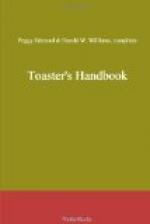“The passion of laughter is nothing else but
sudden glory arising from the sudden conception of
eminency in ourselves by comparison with the inferiority
of others, or with our own formerly.” According
to Professor Bain, “Laughter results from the
degradation of some person or interest possessing
dignity in circumstances that excite no other strong
emotion.” Even Kant, desisting for a time
from his contemplation of Pure Reason, gave his attention
to the human phenomenon of laughter and explained
it away as “the result of an expectation which
of a sudden ends in nothing.” Some modern
cynic has compiled a list of the situations on the
stage which are always “humorous.”
One of them, I recall, is the situation in which the
clown-acrobat, having made mighty preparations for
jumping over a pile of chairs, suddenly changes his
mind and walks off without attempting it. The
laughter that invariably greets this “funny”
maneuver would seem to have philosophical sanction.
Bergson, too, the philosopher of creative evolution,
has considered laughter to the extent of an entire
volume. A reading of it leaves one a little disturbed.
Laughter, so we learn, is not the merry-hearted, jovial
companion we had thought him. Laughter is a stern
mentor, characterized by “an absence of feeling.”
“Laughter,” says M. Bergson, “is
above all a corrective, it must make a painful impression
on the person against whom it is directed. By
laughter society avenges itself for the liberties
taken with it. It would fail in its object if
it bore the stamp of sympathy or kindness.”
If this be laughter, grant us occasionally the saving
grace of tears, which may be tears of sympathy, and,
therefore, kind!
But, after all, since it is true that “one touch
of humor makes the whole world grin,” what difference
does it make what that humor is; what difference why
or wherefore we laugh, since somehow or other, in a
sorry world, we do laugh?
Of the test for a sense of humor, it has already been
said that it is the ability to see a joke. And,
as for a joke, the dictionary, again a present help
in time of trouble, tells us at once that it is, “something
said or done for the purpose of exciting a laugh.”
But stay! Suppose it does not excite the laugh
expected? What of the joke that misses fire?
Shall a joke be judged by its intent or by its consequences?
Is a joke that does not produce a laugh a joke at
all? Pragmatically considered it is not.
Agnes Repplier, writing on Humor, speaks of “those
beloved writers whom we hold to be humorists because
they have made us laugh.” We hold them
to be so—but there seems to be a suggestion
that we may be wrong. Is it possible that the
laugh is not the test of the joke? Here is a
question over which the philosophers may wrangle.
Is there an Absolute in the realm of humor, or must
our jokes be judged solely by the pragmatic test?
Congreve once told Colly Gibber that there were many
witty speeches in one of Colly’s plays, and many
that looked witty, yet were not really what they seemed
at first sight! So a joke is not to be recognized
even by its appearance or by the company it keeps.
Perhaps there might be established a test of good
usage. A joke would be that at which the best
people laugh.




